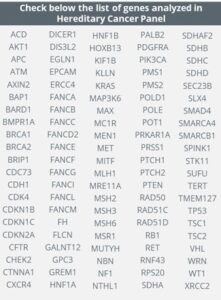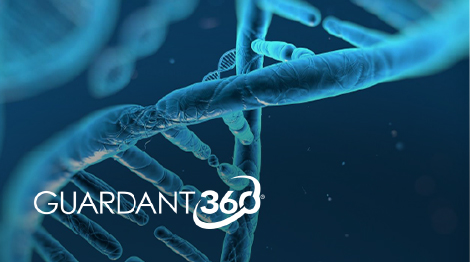Hereditary Cancer Panel
Genetic predisposition to hereditary cancer
Why undergoing this examination?
About 5-10% of all cancers have a hereditary nature, indicating that there is some variation in germline cells that can be transmitted within a family lineage. Detecting variants in genes involved in hereditary cancer development indicates a higher risk of developing certain types of cancer throughout life.
What is the exam?
The Extended Cancer Panel test involves the analysis of 105 genes, providing the identification of point mutations, small insertions, and deletions related to hereditary cancer. Identifying a genetic susceptibility to cancer allows the physician to establish specific effective measures, not only in early detection but also in prevention.
For whom is it indicated?
- Patients diagnosed with cancer at an early age (<50 years);
- Patients with a family history suggesting hereditary cancer or with family members affected by cancer at an early age;
- Patients affected by various types of tumors;
- Patients with cancer who want to know its possible hereditary nature;
- Any patient who wants to know their genetic predisposition for hereditary cancer.
Technology
Next Generation Sequencing (NGS)
Hereditary Cancer Panel
Genetic predisposition to hereditary cancer
About 5-10% of all cancers have a hereditary nature, indicating that there is some variation in germline cells that can be transmitted within a family lineage. Detecting variants in genes involved in hereditary cancer development indicates a higher risk of developing certain types of cancer throughout life.
The Extended Cancer Panel test involves the analysis of 105 genes, providing the identification of point mutations, small insertions, and deletions related to hereditary cancer. Identifying a genetic susceptibility to cancer allows the physician to establish specific effective measures, not only in early detection but also in prevention.
- Patients diagnosed with cancer at an early age (<50 years);
- Patients with a family history suggesting hereditary cancer or with family members affected by cancer at an early age;
- Patients affected by various types of tumors;
- Patients with cancer who want to know its possible hereditary nature;
- Any patient who wants to know their genetic predisposition for hereditary cancer.
Next Generation Sequencing (NGS)
Advantages
SYNLAB GROUP
Guaranteed by the experience of the absolute European leader in laboratory diagnostics.
COMPLETE
- Identified alterations researched in the most complete and up-to-date databases;
- Any pathogenic or uncertain significance variant is confirmed through a new DNA extraction and Sanger sequencing.
Extra Information
DOCUMENTATION – Available on the SYNLAB for clients
- Informed Consent;
- Clinical Questionnaire;
- Family Medical History;
- Medical Request.
PREPARATION
- Fasting is not necessary for the test.
Additional Information


Delivery Time
42 business days

Sample Type
10mL of total blood in EDTA











